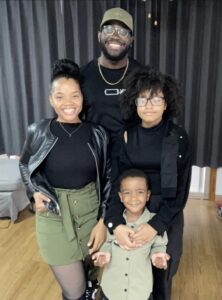What would you do if your ex-partner was able to pay a bribe to escape justice; the very justice you sought for the years he emotionally and physically abused you; justice for the time he almost killed you?
For some women, they would have been eaten alive by the anger, hatred and crippling feeling of defeat. Such is not the case of Jule Bacchus. In spite of being betrayed and heartbroken by a system that should have protected her interest, she walks with her head held high and a heart full of hope. Bitterness will not become her.

Bacchus, a Guyanese woman who now resides in Japan, was jolted back to her horrifying encounters with domestic violence after reading of the tragic murder of Teekadia ‘Atiya’ Solomon. Atiya was shot 10 times by her estranged husband, Alroy Solomon, on August 26, 2025.
“When I heard about Atiya’s death, it was extremely triggering,” said Bacchus. “It was not just another news story, it pulled me right back into my own past.” Bacchus said it reminded her of two things: how close she came to being in Atiya’s position and how little things have changed for women in Guyana.
Sharing her experience, Bacchus said in 2012, she was only 19 when the abuse by her partner reached boiling point.
Like most victims, Bacchus admitted that she ignored the “red flags” in the beginning. She grew up in a home where domestic violence was normalized. At about six or seven-years-old, she witnessed physical abuse, verbal attacks, and particularly, moments where abuse was brushed aside as if it were nothing.
“That environment taught me to normalize dysfunction and believe that women needed to remain quiet to guarantee their safety. As I got older, it shaped my expectations of love,” said Bacchus.
To her mind, relationships ebbed and flowed like rough seas, and therefore, to endure the hardships meant peace was eventually on the horizon. To her tender, loving heart, moments of silent suffering were par for the course. In hindsight, Bacchus said she has come to realize that witnessing domestic violence at a young age blurred her understanding of what healthy love and respect should look like.
It also explained why, when she found love at the age of 16, and began living with her partner’s family, that she did not protest his inclination to control her movements or hurl insults.
Bacchus shared that she tried to seek the help of her partner’s family when his emotional abuse soon turned physical. She recalled one time where he had choked her because she attended a Linden Town Week event with her family. He had forbidden this activity. Despite the gravity of this act, Bacchus said her in-laws downplayed her concerns. They even blamed her for his reaction.
In a separate incident, Bacchus recalled she had attended an event In 2013 that was near her family’s home in Linden. While there, she realized her partner was stalking her.
Following her intuition to take cover, Bacchus said she left the venue but he gave chase. “It all happened so fast. He began chasing me. I made it home and ran up our stairs. He grabbed me, and even though people were nearby, they could not hear me over the music.
“He tried to throw me over the veranda while pressing his hands tightly around my neck, calling me a slut, and hurling other insults. It was one of the scariest moments of my life because I truly thought that night would be my last,” said Bacchus.

By some miracle, Bacchus said her little brother came out, saw the commotion, picked up a spade, and hit her abuser.
“When he finally let go, I had lost my voice and was left completely shaken,” said Bacchus. She made up her mind that it was time to get out. She reported the matter and waited all but 60 days for the case to be heard.
It took 60 days before the matter reached the court. Bacchus recalled that this period of waiting felt like an eternity. During that time, his family constantly begged her to drop the case and was sure to remind her of everything they had supposedly done for her.
When the case finally reached the courts, her partner was sentenced to six months. Her moment of justice being served was fleeting. Her partner never spent a night in jail. Bacchus said officers at the court told him everything could “go away” for the right price, which was paid.
That was the day Bacchus said she lost faith in Guyana’s judicial system. The experience made her feel defeated, terrified, vulnerable, and exposed.
“It showed me that justice in Guyana could be bought, and that women like me cannot always rely on the system for safety. It left me with scars of distrust but also gave me the determination to speak out.” And speak out she did, especially when Atiya’s death went viral on Facebook.
Bacchus shared a synopsis of her own experience and how the system failed her. Following this, a court officer contacted her, promising to investigate her case.
While she welcomed this belated response years later, Bacchus said real change will only occur when DV is tackled on multiple fronts.
The government, she said, needs to enforce stronger laws and eliminate corruption. The justice system, she opined, must also be held accountable so that bribes no longer secure freedom for abusers.
As for families, especially mothers, Bacchus said they too must cease silencing their daughters and pressuring them to stay with abusers.
“Communities also need to normalize education about healthy relationships and demand accountability from men,” said Bacchus.
As a DV survivor, her dream is “a Guyana where women can report abuse without fear, where they can trust the law to protect them, and where silence is no longer the default response to violence.”
If victims are given the support and protection they deserve, Bacchus believes survivors can not only overcome their trauma but also lead fulfilling lives.

Her own life today is a testament to her resilience and courage to rebuild in spite of all she endured. Having served in the U.S. Air Force for four years, Bacchus is now a veteran who supports her loving husband in his military career, all while being a proud mom. She is also juggling the demands of her studies, reading for her Master’s in Psychology at Grand Canyon University.
As she leads her journey of continuous healing, the heart of this mom of two still burns with the hope that one day, no woman in Guyana would have to wonder if law enforcement or the courts will stand on her side.











